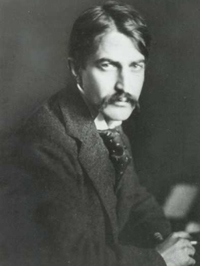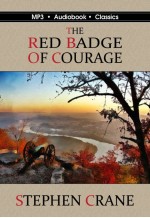Stephen Crane
| Stephen Crane (November 1, 1871 - June 5, 1900) was an American writer considered by modern critics as one of the most innovative writers of his day. He was prolific throughout his short life, beginning to write at age 4, with several published articles by age 16. He is best known for his Civil War novel, The Red Badge of Courage, which achieved international acclaim in 1895 and was applauded for its realistic battle sequences, despite Crane’s lack of battlefield experience. His first novel, Maggie: A Girl of the Street, is considered the first work in American naturalism and was lauded as a true-to-life depiction of life in the slums and tenements. After enduring a public scandal arising from his testimony as a witness in the trial of a prostitute, in 1986 he became a war correspondent. En route to Cuba his vessel sank off the coast of Florida, leaving him and others to drift for 30 hours in a dinghy, an ordeal he chronicled in “The Open Boat”. He went to Europe to cover conflicts in Greece and later lived in England, where he made friends with Joseph Conrad, H. G. Wells and others. Beset by financial difficulties and poor health, he died at the age of 28 in a sanatorium in the Black Forest in Germany. Crane’s work was an important influence on 20th-century writers, most notably Ernest Hemingway and the modernists. |
The Red Badge of Courage
Waiting beside a river for a battle to begin, Henry Fleming, an 18-year-old private in the Union A..
$9.99


